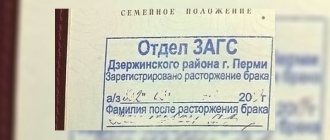Divorce itself is a process that takes some time, and divorce from a foreign citizen is an even more complex procedure and requires more time.
The procedure for dissolving a marriage with a foreigner entered into in Russia has many nuances and features that must be taken into account for a favorable resolution of the case.
Based on the principle of the validity of legal norms in space, the current legislation of the Russian Federation is applied to a foreign citizen entering into a marriage on the territory of Russia .
Marriage and termination of marriage relations with foreign citizens are regulated by the Family Code of the Russian Federation. This procedure is almost similar to the procedure for divorce between Russian citizens, which means divorce is possible both through the civil registry office and in court.
A very important point when divorcing a foreign citizen is recognition of the fact of divorce not only on the territory of Russia, but also on the territory of a foreign state.
Confirmation of the divorce occurs in the relevant authorities of another country upon presentation of all necessary documents or in consular offices and diplomatic missions located on the territory of the Russian Federation.
Divorce from a foreigner in the registry office
The easiest way to dissolve a marriage with a foreigner is through a divorce through the registry office. The divorce procedure in the registry office is quite simple, and the divorce takes place within a month, however, this procedure is possible only if the initiator of the divorce and his foreign spouse have no disputes about children or property and there is mutual consent to dissolve the marriage.
The fact that the other spouse is a citizen of some other state, subject to the above conditions, does not matter, and the divorce occurs according to the usual pattern. To obtain a divorce from a foreign citizen in the Russian civil registry office, you must provide:
- Joint statement of the parties;
- Identity and citizenship documents;
- Certificate of state registration of marriage;
- Receipt for payment of state duty.
If a foreign citizen is in Russia at the time of the divorce process, then 30 days from the date of filing the application, the former spouses must appear at the registry office to receive a certificate confirming the fact of divorce.
Recognition of divorce from a foreign citizen
Article 160 of the RF IC defines the rules for recognizing a family union registered between persons who have foreign and Russian citizenship in another state, as well as their dissolution. Therefore, a divorce from a person with foreign citizenship is carried out in accordance with the norms of family law. In a situation where the official termination of the relationship was carried out outside the territory of the country according to the laws of another country, the divorce must be recognized in the Russian Federation.
Important for the divorce procedure to take place is its acceptance by another state. Its confirmation is carried out by the authorized services of the country upon presentation of the required documentation. When the family is unable to come for the procedure, they should contact the consular or diplomatic office of the country where the marriage was registered.
Divorce from a foreigner in court
The procedure for divorce from a foreign citizen becomes significantly more complicated if the spouses have property disputes or disputes about children. In this case, the divorce will be carried out in a Russian court if at the time of the proceedings the foreign citizen is in Russia, since procedural legislation obliges the plaintiff to file the claim at the defendant’s place of residence.
In this case, the defendant’s place of residence may be considered his place of stay on the territory of the Russian Federation. Next, the procedure for filing a claim will be quite standard, and it will require documents such as:
- statement of claim at the location of the foreign citizen on the territory of the Russian Federation and copies of the statement;
- identification document of the plaintiff;
- marriage certificate;
- an extract from the house management about the place of residence;
- agreement on the division of property or raising children (if any);
- receipt of payment of state duty;
- other documents that are essential for the proceedings.
After the statement of claim is considered accepted for proceedings, the court begins proceedings in the case and subsequently makes an appropriate decision. Additional documents confirming and substantiating the applicant's claims may also be provided during the trial.
How to file for divorce Printable version
For many, the process of divorce is unpleasant, both morally and bureaucratically. In this article, we will try to describe the procedure for filing a divorce as clearly as possible, providing answers to the most frequently asked questions.
The main normative legal act regulating the procedure for ending a marriage is the Code of the Republic of Kazakhstan “On Marriage (Matrimony) and Family”.
In what cases can you get a divorce?
According to the article of the Code, divorce is carried out in the following cases:
- at the request of one or both spouses;
- at the request of the guardian of the spouse recognized by the court as incompetent;
Moreover, according to Part 2 of Article 16 of the Code, it is impossible to dissolve a marriage without the consent of the spouse during her pregnancy, as well as during the first year of the child’s life.
Where to apply for divorce
A marriage can be dissolved in two ways - through the Civil Registry Office (hereinafter in the text we will use the familiar word “Registrar Office”) or through the court. Each of these paths has its own conditions and we will dwell on them in more detail.
The procedure for divorce through the registry office
You can contact the registry office when both spouses agree to divorce, do not have common minor children, and they do not have mutual claims, incl. and in relation to property.
At the same time, regardless of the presence or absence of minor children, a marriage in the registry office can be dissolved if one of the spouses is recognized by the court as missing, partially capable or incompetent, as well as if convicted of committing a crime with imprisonment for a term of at least three years.
If all these conditions are met, then the application for divorce can be submitted online through the electronic service of the eGov.kz portal.
The procedure for divorce through court
Divorce through court is carried out:
- if the spouses have common minor children, except for cases where one of the spouses is recognized by the court as missing, partially capable or incompetent, or convicted of committing a crime with imprisonment for a term of at least three years;
- if one of the spouses does not agree to divorce;
- if one of the spouses avoids divorce;
- if spouses have property or other claims against each other.
If there are minor children and there are no mutual property claims, the court may dissolve the marriage without clarifying the motives if:
- both spouses agree to divorce;
- one of them, by his actions or inaction, avoids divorce.
When making a decision on divorce, the court considers the following issues:
- which parent will the minor children live with after the divorce;
- which parent will pay child support and in what amount;
- division of property in common joint ownership of spouses, taking into account the interests of minor children and the spouses themselves;
- determining the amount of maintenance at the request of the spouse entitled to receive it.
List of required documents for divorce, place of submission and amount of state duty
Through the registry office (in any registration authority on the territory of the Republic of Kazakhstan at the request of the spouses or one of them) - when registering a divorce by mutual consent of the spouses:
- an application in the form in accordance with Appendix 18 to the Rules for the organization of state registration of acts of civil status, amendments, restoration, cancellation of civil status records;
- identification document;
- marriage certificate;
- receipt of payment of state duty (cost - 2 MCI).
When accessing the portal to register a divorce (matrimony) by mutual consent of spouses who do not have minor children:
- an electronic application certified by the service recipient's digital signature or certified by a one-time password, in case of registration and connection of the service recipient's subscriber number provided by the cellular operator to the portal account;
- information on civil registration.
Through the registry office (at the place of residence of the spouse submitting the application) - when registering a divorce on the basis of a court decision that has entered into legal force recognizing the spouse as missing or incompetent, also with persons convicted by a court verdict for committing a crime to imprisonment for a term of at least three years:
- an application in the form in accordance with Appendix 19 to the Rules for the organization of state registration of acts of civil status, amendments, restoration, cancellation of civil status records;
- identification document;
- a copy of the court decision or court sentence;
- marriage certificate;
- receipt of payment of state duty (cost – 0.1 MCI);
- notarized power of attorney, in case of application by a representative of the service recipient.
Through the court - when registering divorce by court decision:
After the divorce in court, there is no need to contact the civil registry office to obtain a certificate, since the registration procedure is automated and information from the Supreme Court is automatically sent to the information system of the Ministry of Justice and a note about its dissolution will be placed in the marriage registration record.
Documents are submitted to the court at the place of residence of the defendant or, if the place of residence is unknown, at the location of his property. The plaintiff may file a claim with the court at his place of residence if, for health reasons, he is unable to attend a court hearing at the defendant’s place of residence, or if a young child lives with the plaintiff.
When filing a claim for divorce in court, the applicant is charged a state duty in the amount of 0.3 MCI. In case of division of property upon divorce, the fee will be 1% of the amount of the claim.
Maintaining or changing a surname during a divorce
According to Article 243 of the Code, a Spouse who changed his surname upon entering into marriage (matrimony) to another must indicate this in the application for divorce (matrimony) about maintaining the common surname or changing this surname to a premarital one during state registration of divorce (matrimony). .
When changing the surname on the basis of a court decision on divorce, the citizen is obliged to exchange identification documents within a month.
Identity documents for a changed surname are issued by an authorized state body on the basis of a court decision on divorce.
Deadlines for state registration of divorce
State registration of divorce (matrimony) by mutual consent of spouses who do not have minor children is provided after one month from the date of filing the application. The period begins on the day after submission of the application and expires on the corresponding date of the next month. If this date falls on a non-working day, then the working day following it is considered the expiration date. The monthly period cannot be shortened;
The period for providing the service for state registration of divorce on the basis of a court decision with persons recognized as missing, incompetent or convicted of committing a crime to imprisonment for a term of at least three years is 45 calendar days.
Divorce in court is carried out after one month from the date the spouses filed an application for divorce in court. In exceptional cases, the court has the right to dissolve the marriage before the end of this period.
If one of the spouses does not agree to divorce, then the court has the right to postpone the trial of the case, assigning them a period for reconciliation within six months. The marriage will be dissolved if these measures are unsuccessful.
A certificate of divorce is issued to each of the spouses at the place of state registration of divorce by the registering authority, i.e. Registry office.
How to request alimony and what is needed for this
When divorced spouses have minor children and there is a question about their further maintenance, this is resolved through the procedure of voluntary or forced (through the court) request for alimony.
Let us remind you that according to the Code “On Marriage (Matrimony) and Family”, alimony is monetary or material support that one person is obliged to provide to another person who has the right to receive it.
The procedure for claiming alimony is a very extensive topic and is highlighted in our separate article - “Alimony in Kazakhstan”. It addresses the following issues in detail:
- Who is entitled to pay alimony;
- How much alimony should be paid?
- From what types of earnings can alimony be withheld?
- How to draw up an agreement on the payment of alimony;
- How to collect alimony in court.
Division of property during divorce
Another painful issue during divorce is the division of the joint property of the spouses. On this topic, we also have a separate material, “Property of spouses in marriage, or who has the right to what during a divorce,” which we strongly recommend that you read. It covers the following issues:
- What applies to personal property;
- What applies to the joint property of spouses;
- Shares of spouses in joint property, and what is taken into account by the court when dividing property;
- How to divide real estate during a divorce or special cases of division of property;
- Are debts or the spouses' responsibility for obligations divided during a divorce?
- How to apply to the court for the division of property during a divorce or after a divorce.








